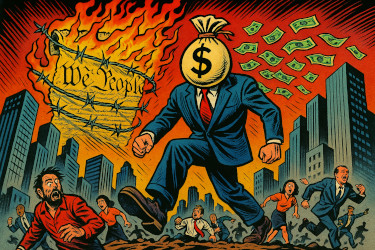'Elections' and Other Fantasy Stories From US Oligarchy
June 9, 2025
An oligarchy is a system of government where a small group of people wield a disproportionate amount of power in government.
 For years, government champions have claimed that the United States is not an oligarchy, firstly because of its democratic institutions. The United States holds regular elections for various local, state, and federal positions. Sadly, this activity does not refute the claim of oligarchy. The small group of US elite have a firm grip on the levers of power, despite any outcome of elections.
For years, government champions have claimed that the United States is not an oligarchy, firstly because of its democratic institutions. The United States holds regular elections for various local, state, and federal positions. Sadly, this activity does not refute the claim of oligarchy. The small group of US elite have a firm grip on the levers of power, despite any outcome of elections.
- In 2020, Joe Biden promised to increase the corporate tax rate from 21% to 28%. Once in office, the idea was not entertained.
- In 2016, Donald Trump promised to reduce the national debt. Once in office, thanks to tax cuts and Covid Expenses, the national debt ballooned from $20 trillion to $27 trillion dollars.
- In 2008, Barack Obama campaigned on the promise to close George W. Bush’s Guantanamo Bay detention center. Once elected, he kept the facility operational. He also promised greater limits and transparency on domestic spying programs. Once elected, George W. Bush’s Patriot Act and NSA surveillance programs were extended.
- In 2000, George W. Bush said he disagreed with the Clinton administration’s foreign policy, saying "I don’t think our troops ought to be used for what’s called nation-building." He also said he would pursue diplomacy rather than use force, relying on a non-interventionist foreign policy. The very next year, he began the largest global campaign to redraw the map of middle eastern nations, and became the first US President to launch first strikes against nations and adopted the doctrine of preemptive war.
- In 1992, Bill Clinton promised tax cuts for the middle class. A year later, he signed the Omnibus Budget Reconciliation Act which raised those same taxes.
- In 1988 George H. W. Bush promised ‘Read My Lips: No New Taxes!’ two years later, he introduced a new tax.
Does it sound like the will of the people is being served? Do these sound like unfortunate changes in plans from a leader? Or, does it seem like these are promises from people who just have to say whatever it takes to get elected? Once they are in power, their promises made don’t matter. They don’t have to do as the people demand, but must comply to the will of the elite.
If you are one of the people who say that George W. Bush changed his mind because of the events of September 11th; Yes, I agree with you. My point is not that they changed their minds, but that no matter who the people voted into power, no policy would have changed. The vote of a particular leader or President is inconsequential to exact meaningful change in the lives of the electorate.
 The second thing government proponents raise is that the US is governed by ‘the Rule of Law’ with mechanisms to hold people to account for their actions. Usually I just giggle at this argument, but since this is not a dinner party, let me pretend like I take such an assertion seriously.
The second thing government proponents raise is that the US is governed by ‘the Rule of Law’ with mechanisms to hold people to account for their actions. Usually I just giggle at this argument, but since this is not a dinner party, let me pretend like I take such an assertion seriously.
- In 2014, Flint Michigan began taking water from the Flint River and supplying it to the populace. The only problem was, it was never treated and was contaminated with lead and bacteria. Government regulators (whose only job is to monitor this type of thing) neglected and even covered up the problems at the behest of the corporations involved. Residents now suffer long term health problems from this criminal activity. Charges against the culpable were dropped or settled out of court.
- As early as the 1970’s ExxonMobil scientists noted that they were aware that their product was causing significant environmental damage. However, whenever challenged about it, leadership would deny or downplay any negative impact of their operations. Eventually, it came out that the corporation had known of detrimental effects all along, and were covering it up. Charges brought against the guilty were either dismissed on technicalities or slow-walked through to its death. Exxon has board members who sit on regulatory boards of its own industry, which you would think would be a conflict of interest.
- Other companies like 3M and DuPont lobby regulatory boards to ensure they are never effectively regulated. Either their influence or arguments were very powerful. Oh, wait, it couldn’t have been their arguments, because it turned out the PFAS chemicals they were manufacturing do not break down in the environment, and cause cancer, immune disorders, and other health problems, and more damning, the link between them was well known going back to the 1960’s. It turned out the companies did receive a fine for their role in the scandal, but they are still permitted to manufacture them and are still unregulated.
- Purdue Pharma marketed their OxyContin medication to doctors who prescribed high amounts of medicine as a general pain relief drug. They offered these doctors incentives to push their product, knowing its addictive properties. Thousands died, and it led to the current opioid crisis. The company filed for bankruptcy and the owners negotiated an agreement without admitting wrong doing, meaning they could not be held liable.
Would you describe the legal system as one that protects the people? It works as designed; it appears to be balanced, but in reality favors those with power.
The financial power of large corporations can negate law. They are also very good at guiding messaging coming from media outlets, including the so-called free press. Often, media outlets will participate in cover-ups and shouting down of scientists. They are after all, ran by corporations. Activist groups and watchdog agencies who are all supposed to serve the people also are forced to bow before corporate supremacy.
- In 2017 a collection of internet freedom groups banded together to fight the repeal of Net Neutrality. They managed to organize a massive public campaign where overwhelming amounts of people raised their voice and asked the government to keep Net Neutrality. As you would expect, the FCC under Ajit Pai claimed the voice of the public was fraudulent, ignored it and sided with telecoms to repeal Net Neutrality and fast-tracked deregulation.
- The World Heath Organization classified glyphosate a probable carcinogen in 2015. Environmental and food safety groups argued to the Environmental Protection Agency (EPA) to have it removed from the market. The manufacturer Monsanto, who use it in their weed-killer ‘Roundup’, successfully lobbied to have their concerns dismissed, and the EPA ruled Roundup was safe. Individuals were forced to sue Monsanto by themselves to get a cash settlement for causing their cancer. In the subsequent trials, it came out that Monsanto had ghostwritten scientific papers that suppressed any critical research into the chemical. They also demonized scientists who spoke out about the dangers. To date, 177,000 cases have been brought against the company.
- Starting in 2012, The New York City Housing Authority (NYCHA) was ordered to inspect its properties to look for lead paint. Children are very susceptible to lead and cannot be in contact with any amount. The order was to protect children from lead’s role in developmental issues. Instead, it just falsified records to show that it had done the inspections. A 2017 investigation showed that this was going on, and the housing authority finally admitted that it had not performed the inspections. Thousands of children living in their housing had been exposed to the serious neurotoxin. A federal official was asked to supervise the reforms. To date, remediation has been lackluster, without any urgency. As expected, children living in the residences are now reporting developmental issues.
- Before the 2010 Deepwater Horizon disaster, environmentalists and industry watchdogs raised alarms that thanks to regulatory loopholes, the way corporations were performing offshore drilling operations was dangerous. The government agency responsible for managing natural resources in the area, the Minerals Management Service did not enforce its own regulations, had close relationships with the corporations it should have been regulating, and even lobbied for increasing development instead of its mission of safety and environmental protection. The agency was disbanded after the incident that caused :
- the deaths of eleven people,
- devastating environmental damage,
- closed 88 thousand square miles to commercial fishing,
- economic damage to the Louisiana fishing industry in the immediate loss of work and also in the long-term reduced fish stock from the elimination of important fish breeding grounds.
These events are not isolated incidents. Time and again the power of civil rights, watchdog, or even regulating agencies and the reporting of the press have little effect beyond alerting the public of the concern. In each, we see the constitutional rights of people ignored in favor of the will of corporations. Even when the problem has yielded a fine or censure, the activity continues as always.
 The hallmarks of both a democracy and a republic is that the nation’s ultimate authority rests in the people. In the United States, the people have been given a token activity called ‘the vote’ which has no authority in the force that actually controls government. No matter who the people elect, their ‘representatives’ only accountability are to the small group of elite who have the power.
The hallmarks of both a democracy and a republic is that the nation’s ultimate authority rests in the people. In the United States, the people have been given a token activity called ‘the vote’ which has no authority in the force that actually controls government. No matter who the people elect, their ‘representatives’ only accountability are to the small group of elite who have the power.
A democracy is supposed to allow a range of political parties and candidates. In the United States it is structured so that any candidate or political party with a hope of success must be tapped into this fountain of dollars, which in turn demand loyalty to it, and not the people.
A republic is supposed to hold its constitution as the greatest governing body in the nation. It sets the limit of government power and the rights of its people including minorities. In the United States this document is largely ignored unless the rights of a corporation is violated.
It’s time to call the United States what it truly is: an oligarchy. Cloaked in the language and theater of democracy but driven by the interests of a powerful few. The United States’s political system serves not its citizens, but a closed circle of elites who wield immense wealth and unchecked authority. Referring to it as a democracy or even a republic only legitimizes a facade. By naming the system accurately, we not only uphold the truth—we also stand in solidarity with those silenced by corruption and repression. Words matter, and in the face of autocratic power, clarity is a form of resistance.
Zaarin -- Founder n·h·g